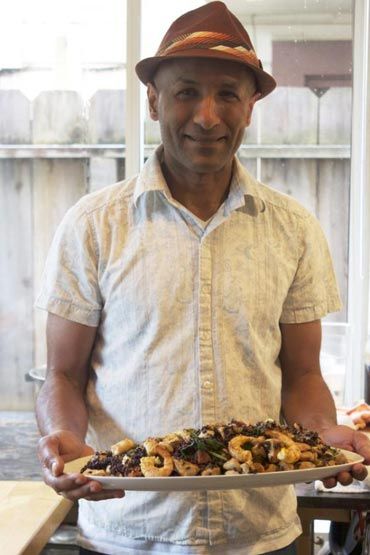Welcome to a column wherein we track down a cook good with an accent and milk them for all their best kept eating secrets.
Eskender Asegad is the chef and founder of Radio Africa & Kitchen(4800 Third Street), a new restaurant in Bayview with deep roots in the city, and Ethiopia. Asegad actually never aspired to have a brick-and-mortar restaurant, but the story of how he ended up where he is—cooking sustainably and locally sourced African cuisine in San Francisco—is a very inspiring one nonetheless.
At age 19, Asegad and his younger brother embarked on a 300 mile trek out of Ethiopia to flee the communist government. They landed in Sudan and were granted asylum in the U.S. four years later. Almost immediately upon arrival in New York in 1986, Asegad flew to San Francisco to visit friends. You could say the rest is history.
Asegad's first jobs were in restaurants, where his open, friendly personality and quick intellect landed him in chef and server roles in no time. He counts his years at the legendary Square One with Joyce Goldsteinand during the Daniel Humm era at Campton Place as hallmarks of his early career that continue to shape the way he cooks today.
While cooking in professional kitchens, Asegad's Radio Africa & Kitchen was born as an underground dinner experiment out of his home. In-the-know types from all over San Francisco would gather at communal tables in his kitchen and garden patio, digging into a confulence of African flavors and California ingredients that was like nothing else in the city. The concept continued to build steam in 2004, when it morphed into a pop-up restaurant at Velo Rouge Cafe. A few years later, The City approached Asegad and asked him to open a restauant in its Third St. Corridor development project in Bayview.
Asegad agreed, and he immediately started building a community garden across the street from the future restaurant site, so he could introduce the community to fresh, natural ingredients first. He beleived this would lay the groundwork for what was to come at the restaurant.
It took two and a half years of fundraising and city planning to get the restaurant off the ground, and now, today, the permanent location of Radio Africa & Kitchen is ringing in its second week in business. Asegad caught up with 7x7 on Sunday—after a week's worth of 16 hour days and one centering game of soccer—to talk about the best Ethiopian food in the Bay Area.
1. Berbere lamb at Asmara (5020 Telegraph Ave.)
This restaurant focuses more on the cuisine of Northern Ethiopia, and they have the most authentic sauteed lamb with onions and injera (Ethiopian bread). It has the right balance of spices—not too hot.
2. Vegetarian combination at Cafe Colucci (6427 Telegraph Ave.)
For vegetarians, this is the spot. The combination platter has fava puree, two kinds of lentils with berbere, gomen—or mustard greens cooked with ginger and shallots—and alicha, a combination of cabbage, green beans, potatoes and carrots cooked with turmeric.
3. Sauteed chicken at Cafe Ethiopia (878 Valencia St.)
This is probably the cleanest, most well-kept Ethiopian restaurant in the Bay Area. I go here all the time and get the sauteed chicken, which comes with an amazing rendition of berbere made with fresh ginger, shallots, basil and garlic. You can also call a day ahead and ask them to make you fresh-baked injera to-go.
4. Spices at Brundo (6419 Telegraph Ave.)
You can get everything you need to make berbere at home at this market or many of the other markets near Cafe Colucci on Telegraph. The best berbere is made with a mixture of dried hot and sweet paprika, cayenne, fenugreek, ajuan seeds, and cardamom. Then you add fresh ginger, shallot, basil and garlic that have been ground with a mortar and pestle and fermented. It's a long process we'll be teaching on Mondays starting this summer at the restaurant.
5. Alicha-Beggee at Assab Eritrean Food (2845 Geary Blvd.)
The lamb dish here is amazing with a spice mixture that's more sweet than spicy hot. It's very intruiging, with a generous amount of garlic—a very soul-warming dish.
Related Articles
